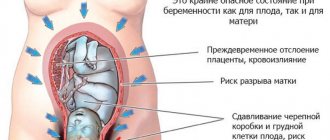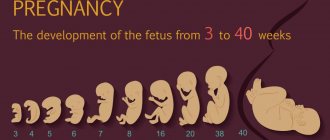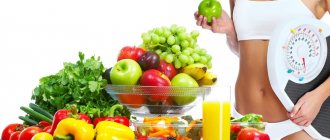Diets, Diets for mothers
250638
5
Hundreds of articles have already been written about the fact that nutrition should be correct. And this is no coincidence. After all, our health and even life expectancy depend on how we eat. But you need to pay special attention to nutrition during pregnancy and following a diet for pregnant women. The expectant mother now needs to take care not only of herself, but also of the health of the new little person who will be born very soon.
Doctors divide the entire pregnancy period into three stages - trimesters. The duration of each of them is three months. And this division is not accidental, since the development of the embryo occurs “according to plan.” Particularly important changes that occurred in the fetus during any period can tell us about the correctness of its development. In order for the baby to receive everything he needs at each stage of his development, the mother needs to adjust her menu. Moreover, it is important that foods that are healthy in the first trimester may be prohibited in the second or third. That is why the menu differs by trimester. But there are a number of general rules for the entire period of pregnancy:
- Eating 5-6 times a day in small portions, chewing carefully, is ideal;
- Last meal 3 hours before bedtime;
- Alcohol is prohibited!
- We refuse fried, smoked food and various pickles; it is better to eat boiled, stewed, steamed or baked in the oven;
- The priority is to eat only healthy foods - fruits, vegetables, cereals, vegetable oil is also useful;
- We take vitamin complexes throughout pregnancy!
Basic nutrition rules in the third trimester
Every woman who is expecting a child and takes a responsible approach to the issue of his health should change her diet to a more correct one. During pregnancy, all expectant mothers gain weight. This is absolutely normal and even necessary. But there are some standards according to which on average you gain 10-12 kg during pregnancy.
This is the optimal weight gain, in which the child will receive everything he needs, will not gain excess weight, which is important for an easy birth, and the young mother will quickly return to her shape. The process of weight gain is directly determined by the duration of pregnancy. In the third trimester, weekly weight gain should be 300-400 grams. For women who are obese, it is especially important to follow a diet at this stage.
During pregnancy, the expectant mother should eat not for two, but for two, paying attention to the quality of food, not its quantity.
Scientists from Sweden and Norway believe that pregnant women who eat properly, especially in the 3rd trimester, are significantly less at risk of premature birth.
Types of fasting days
Nutritionists offer a variety of ways to unload the body of a pregnant woman. It is necessary to choose the appropriate option individually with a doctor, who will take into account the health status of the expectant mother and the purpose of the event.
Each type of unloading has its own healing properties. If you have kidney disease, liver disease, hypertension or edema, apple or watermelon days are recommended. If a woman has obesity or atherosclerosis, you should give preference to low-fat kefir. Fasting days on buckwheat during pregnancy are recommended for women who suffer from constipation.
Expectant mothers with diseases of the digestive system are contraindicated on days with dietary restrictions, where they can only consume fermented milk products or meat, which brings minimal benefit to the body.
The best options for fasting days for women who are in an interesting position are buckwheat, apple and kefir. A similar diet during pregnancy maintains energy throughout the day and helps satisfy hunger. Apples can only be consumed by those who do not have gastritis.
Many useful step-by-step recipes with buckwheat can be found here!
For swelling
Minor swelling while waiting for a baby is a natural phenomenon. During labor, most of the fluid accumulated in the body is eliminated. The remaining volume will be released in the first week after the baby is born.
To reduce swelling, you should lead an active lifestyle and adhere to the principles of proper nutrition:
- Reduce the amount of salt you consume as much as possible.
- Establish a drinking regime.
- Avoid eating smoked and fatty foods.
- Give preference to boiling and steaming food.
- Include vegetables, herbs and fruits in your daily menu.
- Have snacks between main meals.
- In the absence of contraindications, unload the body.
"Hungry" days
This weight loss option is quite effective. “Hungry” days allow the digestive system to rest, and the pregnant woman’s body has time to cleanse itself.
| Type of fasting day | Approximate daily diet |
| Vegetable | On this day it is better to choose zucchini, zucchini, cucumber, cabbage, and bell pepper. Vegetables can be consumed raw or boiled. No more than 1.5 kg is allowed per day. |
| Kefir | You are allowed to drink no more than 1.5 liters of low-fat kefir per day. You can't eat. |
| Watermelon | You can't eat anything except watermelon all day. Don't forget about your drinking regime. The daily limit is water of at least 1.5 liters and no more than 1.5 kg of watermelon. |
| Apple | The preferred option for unloading the body in the summer. Apples are eaten baked or fresh. When preparing, you should avoid using sugar, but you can pour honey over the fruit and sprinkle with cinnamon. The norm is up to 1.5 kg. |
| On juice | Consume no more than 1 liter of freshly squeezed juice. The drink is prepared immediately before consumption. Juice can be made from berries, fruits or vegetables. |
"Fed" days
This is an excellent option for expectant mothers who cannot stand the feeling of hunger. Such fasting days are perfectly combined with the dietary nutrition of nursing women.
| Type of fasting day | Approximate daily diet |
| Curd | It is permissible to consume 600-800 grams of berries and 400 grams of low-fat cottage cheese per day. You need to give up sugar. When choosing berries, give preference to seasonal ones. A little milk or low-fat kefir can be added to the diet if cottage cheese without adding sour cream seems dry. |
| Buckwheat | Buckwheat is not cooked, because in this case it loses its beneficial properties. A glass of buckwheat is filled with 1.5 glasses of low-fat kefir and placed in a dark and cold place for 12 hours (the refrigerator cannot be used). Salting the dish is prohibited. |
| Fruit | You can choose any fruit, but consume no more than 1 kilogram per day. They are used to make salads or eat in their pure form. |
| Potato | You can consume no more than 2 kilograms of boiled or baked potatoes per day. It is not prohibited to add up to 2 glasses of low-fat kefir to the diet. |
| Rice | Brown rice in the amount of 150 grams is boiled without salt until tender. You can add carrots, sweet bell peppers or an apple to the dish. |
Here is an interesting recipe for cottage cheese casserole with buckwheat flour.
Nutrient balance
In the diet of a pregnant woman in the 3rd trimester, changes occur in the distribution of basic nutrients. The amount of protein is reduced to 96 g (animals - 60 g) due to the fact that all the organs and tissues of the child are already formed. Carbohydrate consumption in the third trimester also decreases to 340 g, and the amount of fat during normal weight gain increases to 90 g (vegetables - 23 g).
According to the recommendations of the Research Institute of Nutrition of the Russian Academy of Medical Sciences, the energy value of food is 2556 kcal per day.
Sample menu for every day
| Days | Breakfast | Dinner | Afternoon snack | Dinner | 2 dinner |
| Mon. | Fasting day | ||||
| Tue | Oatmeal with butter, Black tea with caramel, apple | Chicken soup with potatoes and carrots, boiled chicken breast, cucumber salad | Muesli with juice | Boiled fish with fresh herbs | Kefir |
| Wed. | Rice porridge with butter, juice | Roast beef with vegetables, dried fruit compote, green salad | Grated carrot salad | Boiled chicken breast | Low-fat yogurt without additives |
| Thurs. | Buckwheat porridge with butter, rye bread with cheese, tea | Fish soup, grated beet salad, jelly | Baked apples | Steamed meat cutlets | Bifivit |
| Fri. | Oatmeal porridge, fruit yogurt | Dietary cabbage soup, steamed cutlets, fruit drink | dried fruits | Meat salad with a slice of rye bread. | Kefir |
| Sat. | Curd cheesecakes, fruit salad | Vegetable soup with meatballs, compote | Rye bread | Steamed fish with rice | Low fat yogurt |
| Sun. | Steamed omelette, rye bread with cheese | Borscht with boiled beef, tea | Fruit salad | Buckwheat with mushrooms | Bifivit |
Essential vitamins and minerals
The child receives all the nutrients that are necessary for normal growth and development from the mother’s body, so the need for vitamins and minerals increases sharply as the baby grows. The most beneficial substances are found in fresh fruits and vegetables.
Complex carbohydrates, which are found in legumes, brown rice, oatmeal, and whole grain bread, will help you get folic acid, fiber and B vitamins, which are involved in all metabolic processes.
Folic acid is very important at all stages of pregnancy, because with its help the baby’s nervous and cardiovascular system is formed. Pregnant women have a high need for folic acid - up to 600 mcg, and it is possible to get it in the right amount only with the help of a properly formulated diet in the third trimester.
And also in the 3rd trimester, pregnant women’s need for calcium increases sharply, so that the child develops a strong skeleton and teeth. The main sources of calcium are milk, cheese, and cottage cheese. Magnesium is a vital element for everyone. It increases calcium absorption, helps convert energy in cells, lowers blood cholesterol, reduces the risk of stone formation, and in pregnant women helps prevent cramps and premature birth.
Iron promotes hematopoiesis in the baby and his mother. Vitamin D is especially needed in the 3rd trimester of pregnancy, because without it calcium cannot be absorbed. Contained in fermented milk products and fish.
Canadian scientists have concluded that a lack of vitamin D during pregnancy further contributes to the development of caries in the child.
Cottage cheese during pregnancy
Pregnant women often hear recommendations to eat more cottage cheese. It is believed that it is a source of calcium, which is so necessary for the baby growing in the womb and his mother. But situations are different, not all women love cottage cheese and want it. This article will tell you whether cottage cheese is useful during pregnancy and how to take it correctly.
Is it possible or not?
Cottage cheese is essentially a dairy product. This is the thickened part of sour milk, which is freed from the liquid component - whey. The product can and should be eaten by pregnant women if the woman herself wants it. But you shouldn’t force yourself, despite all your dislike for cottage cheese, to eat this product. And here's why - the benefits of cottage cheese as a storehouse of calcium are somewhat exaggerated . Judge for yourself - 100 grams of product contains about 120 mg of calcium. And the daily requirement of a pregnant woman for this element is on average from 1500 to 2000 mg.
It turns out that in order to cover the daily requirement for calcium, a pregnant woman needs to eat more than a kilogram of cottage cheese. In such quantities, a fermented milk product is unlikely to be beneficial. That is why cottage cheese is a voluntary activity. If you want, eat, if you don’t want, don’t force yourself. There are foods that are also rich in calcium and may well be sources of the element in the diet, for example, fresh greens, certain types of fish, in particular sardines, Parmesan cheese and sesame seeds.
The need for calcium when carrying a baby is great. It is especially important that a woman consumes enough of it in the middle of pregnancy, when the process of mineralization of the baby’s bones is underway. But whether this need will be satisfied with the help of cottage cheese is not significant.
It is important to include foods high in calcium in your diet.
Benefits for the expectant mother and baby
The product is rich in vitamins A, B, PP, C and D. It can also partially replenish part of the daily requirement for phosphorus, calcium, magnesium, and iron. The value of the product is also due to the presence of amino acids such as tryptophan and lysine. In addition, this fermented milk product contains bifidobacteria and some enzymes that are beneficial for digestion and intestinal function. Compared to other dairy products, cottage cheese contains the smallest amount of lactose, so it is perfectly acceptable in the diet of pregnant women who suffer from individual lactose intolerance.
With all the advantages, there is also a drawback - cottage cheese is a rather high-calorie product, especially when it comes to homemade village cottage cheese. Therefore, for expectant mothers, a low-fat product or a product with a low fat content - up to 9% - is considered preferable. Cottage cheese, like dairy products, is an important component of proper nutrition while waiting for the birth of your baby. But the main benefit comes not even from calcium, but from casein. This protein is easily absorbed by the human body and has high nutritional value.
Eating cottage cheese for pregnant women, if they like it, is healthy. The baby's need for calcium is great, and during the period of bone mineralization, which begins at the end of the first trimester and lasts throughout the second, the baby will definitely take as much calcium from the mother's blood plasma as he needs. If there is little calcium, the bone tissue, hair, nails and teeth of the pregnant woman will suffer. Phosphorus in the product is important for the muscle tissue of both the expectant mother and her baby. B vitamins are needed for the full functioning of the nervous system. The beneficial lactic bacteria in the composition will carefully and delicately support the functioning of the intestines.
In the early stages, curd treats often help out women suffering from toxicosis. Populating the intestines with colonies of beneficial bifidobacteria helps reduce the unpleasant symptoms of toxicosis. The presence of the amino acid tryptophan allows us to call cottage cheese and dishes made from it a food of good mood; this amino acid improves sleep and appetite, supports the production of serotonin. Digestion of this product does not require significant stress on the liver and pancreas.
Digestion will be more comfortable if a woman chooses grainy cottage cheese.
Possible harm and contraindications
The product is not recommended for women who have an individual allergy to milk and milk derivatives. An adult body does not need milk at all from a biological point of view, and scientists are increasingly saying that the benefits of milk and cottage cheese are greatly exaggerated. Therefore , women who experience discomfort after such food, suffer from intestinal disorders or nausea after eating cottage cheese products should replace cottage cheese with any other product high in calcium, for example, hard cheese. It is not advisable for expectant mothers who suffer from gastritis with high acidity of gastric juice to eat cottage cheese dishes. If you have other chronic diseases of the gastrointestinal tract, then it is better to opt for unleavened cottage cheese.
There are restrictions on the use of this product for women with kidney disease, so before deciding on the use of curd dishes, it is better to consult a doctor . Can cottage cheese harm a pregnant woman? Yes, and this possibility exists not only among women with obvious contraindications. If the product was stored incorrectly, in violation of the requirements, then pathogenic bacteria, E. coli, multiply in it very quickly. This can cause severe poisoning. And it’s not enough to pay attention to the expiration date; for such a dangerous product, it may be quite valid.
It is important to evaluate the conditions under which the product is sold. Buying country cottage cheese from a green market counter or on the side of the road is definitely not worth it.
How to use it correctly?
Calcium needs vary among pregnant women. A doctor will help you determine the exact daily norm by first assessing the level of your own calcium in the blood of the pregnant woman based on the results of blood tests. It is usually recommended to eat the product about 3 times a week. Often cottage cheese is introduced as a relief. A fasting day on kefir and cottage cheese helps to lose a couple of extra pounds, so women willingly go on such days before scheduled visits to the doctor.
Unloading on cottage cheese is recommended for pregnant women no more than 2-3 times a month if they are gaining too much weight, have high blood pressure and edema, obesity, or a high risk of gestational diabetes. In the early stages up to 29 weeks of pregnancy, such unloading is not recommended. Afterwards, the need for a day on cottage cheese and kefir is discussed with your doctor on an individual basis. Usually during this day you need to eat about half a kilogram of low-fat cottage cheese in combination with a kilogram of apples or other fruits that are not prohibited. You can eat cottage cheese with raisins and dried apricots. It is better not to combine cottage cheese with sour cream on fasting days; this significantly increases the calorie content.
If a woman has heartburn from cottage cheese, then the product can be replaced with hard cheeses. It is not necessary to introduce cottage cheese in its pure form. You can make mousses, cheesecakes, cottage cheese casseroles. If you are not allergic, you can combine the product with honey and various berries. You can make wonderful desserts from cottage cheese.
Choose only fresh, low-fat or low-fat products. Make it yourself or buy it only from those points of sale where temperature and other sales conditions are fully met.
Features of use by trimester
There are some features of using the product depending on the exact gestational age.
- The 1st trimester is the time of embryogenesis, when the internal organs and systems of the child’s body are formed. The consumption of curd products is not mandatory, it is optional. It is prohibited to spend a fasting day on cottage cheese.
- The 2nd trimester is the time of active mineralization and growth of the baby’s bone tissue. Cottage cheese, if there are no contraindications, is highly recommended.
- The 3rd trimester is the time when the amount of product consumed should be gradually reduced so that in the last weeks the amount of cottage cheese and other calcium-containing products is minimized. This is important to prevent early hardening of the skull bones, which can lead to complications during childbirth. That is why in the last weeks before giving birth, doctors do not advise eating cottage cheese and consuming dairy products.
Healthy foods for pregnant women in the third trimester.
Pregnant women in the last stage of pregnancy are recommended to eat the following foods:
- Poultry, lean meats: turkey, chicken, veal and beef.
- Fish: salmon, trout, chum salmon, hake, pollock, anchovies.
- Vegetables and fruits: all fresh vegetables and fruits, as well as raisins, dried apricots, prunes.
- Nuts: walnuts, peanuts, cashews, and almonds are especially useful.
- Milk and fermented milk products: in the 3rd trimester, preference is given to fermented milk products - kefir, fermented baked milk, yogurt without preservatives.
- Cereals: buckwheat, oatmeal (but not every day, otherwise it washes calcium out of the body!), brown rice, muesli.
- Whole grain and rye bread, wheat bran.
For maximum absorption of nutrients, all poultry, meat and fish dishes should be cooked in the oven or steamed. In addition, fatty foods in the 3rd trimester cause a number of gastrointestinal disorders in the expectant mother. It is recommended to eat vegetables raw or baked, so they retain as many vitamins and microelements as possible.
In the third trimester, the amount of circulating blood increases, so the expectant mother will want to drink more than in earlier stages. But still, don’t get too carried away. If there is no swelling, you can drink 1.5-2 liters of liquid per day. It is best to drink clean, still water; it best helps cope with thirst.
The benefits and harms of a fasting day for a pregnant woman
Benefits that the expectant mother receives:
- the body is cleansed of toxins and waste;
- excess fluid is removed;
- additional microelements and vitamins come from foods;
- weight loss;
- blood pressure is normalized;
- swelling goes away;
- the walls of blood vessels and the heart muscle are strengthened;
- kidney and liver function is restored;
- the digestive system is unloaded and rests;
- metabolic processes improve;
- nails and hair become stronger, skin becomes smoother and healthier.
Fasting days do not bring harm if you follow the recommendations of a specialist and listen to your own body.
What not to eat in the third trimester of pregnancy
Particular attention should be paid to the consumption of sugar and salt. Excessive consumption of sugar in the third trimester of pregnancy can lead to excess weight of the fetus and there is a risk of the baby developing diabetes mellitus. And because of the passion for salt, swelling appears and metabolism slows down. Therefore, in the diet of the 3rd trimester, the amount of salt is significantly reduced, and it is recommended that dishes be under-salted.
The following foods should be excluded from the diet of a pregnant woman in the third trimester:
- sushi and raw seafood (a favorable environment for the growth of bacteria);
- fast food.
- soft cheeses (favorite environment for bacteria)
- insufficiently processed or incompletely cooked meat (contains helminth larvae);
- raw milk and eggs;
- sausages;
- semi-finished products;
- fatty and smoked foods;
- spicy seasonings;
- caffeine (affects the development of the baby’s nervous system and can cause premature birth);
- carbonated drinks;
- alcohol;
What can be used as a substitute if there are contraindications for use?
Despite its benefits, this dairy product also has contraindications, including:
- Lactose intolerance.
- Pancreatitis in acute form.
- Ulcer, gastritis in aggravation.
- Increased gas formation and stomach fermentation.
- Atherosclerosis.
- Acute kidney disease.
In such cases, you should stop eating cottage cheese until your doctor allows you to reintroduce it into your diet.
If there are contraindications, you can replace cottage cheese with mozzarella, low-fat kefir or yogurt. Of course, it is better if such products are homemade with the addition of beneficial bifidobacteria and lactobacilli.
Cottage cheese is included in a woman’s diet after childbirth.
From the second day after the birth of the child, it is permissible to include low-fat varieties of products and cheeses.
This dairy delicacy promotes improved lactation and helps stabilize the gastrointestinal tract against the background of hormonal changes.
The beneficial properties of the product and lactobacilli are contained in the cottage cheese for the first 3 days, after this period their number gradually decreases. By the end of the 7th day, their quantity is so insignificant that the benefits of dairy products are practically worthless.
Cottage cheese is a healthy and almost irreplaceable product that should be in the diet of every pregnant woman. in addition to calcium and vitamins A, C, PP, such a product has a positive effect on the woman’s digestive system, helping to normalize stool, which is especially important before childbirth.
Diet in the 3rd trimester
In order to avoid unnecessary weight gain in the third trimester, you should adhere to a proper diet. It is recommended to eat 5-6 times a day: 3 full meals, 2-3 snacks. If you stick to this way of eating throughout the 3rd trimester, your body will get used to it and will absorb food much more efficiently.
It is not recommended to eat as soon as you wake up and several hours before bedtime.
Fish and meat are best consumed baked or boiled for breakfast or lunch. Since the animal proteins they contain activate the nervous system. And for dinner - stewed vegetable products or salads, and dairy products - casseroles, cheesecakes, cottage cheese.
Drink a glass of kefir or milk at night so as not to overload the digestive system. The peculiarity of nutrition in the third trimester is to eat in small portions, because the weight of the baby puts pressure on the organs of the expectant mother.
How to lose weight during pregnancy. Diet for pregnant women in the 1st, 2nd and 3rd trimester.
One way to maintain normal weight during pregnancy is diet. It is worth understanding that a diet for pregnant women is not a tribute to fashion. Proper, measured nutrition and maintaining a normal weight are the key to a successful birth. Let's look at diets for losing weight during pregnancy and distribute them by trimester.
Losing weight during pregnancy. Introduction.
It is worth understanding that weight changes during pregnancy are quite common. But if you notice that weight is gaining too quickly, then you should think about it. The risk of diabetes increases dramatically. And this obviously will not have a positive effect on the baby’s health. Diet during pregnancy is extremely necessary. Even if you are not overweight, you should still stick to it.
Diet for pregnant women. Basic provisions.
Before moving directly to the diets for semesters 1, 2 and 3, we will consider the general provisions that must be followed first:
- Give up sweets. Sweets won't help you stay in shape.
- Refusal of smoked meats and marinade
- During the first trimester, focus on protein foods. The more protein your body absorbs during this period, the better. But don't overdo it
- During the second trimester, focus on foods high in calcium.
- In the third trimester, we completely abandon meat products. It is also worth reducing the daily volume of water. Reduce it to 1 liter per day
- Use vitamins only with your doctor's permission.
Diet during pregnancy. 1st trimester.
In the first trimester of pregnancy, a protein diet is recommended. Protein is essential for building the body, so in the first three months of pregnancy you should include as many protein-containing foods as possible in your diet. The rest of the list of recommended products does not differ from the daily diet.
Recommendations for pregnant women in the 1st trimester:
- Eat more greens
- Try to cook fish dishes daily
- Try to drink low-fat dairy products
- We exclude coffee from drinks. Alcoholic drinks especially
- Do not under any circumstances reduce the amount of salt you consume. A salt-free diet during pregnancy is useful only in the later stages
- Eat more fruits and vegetables
- Don't forget about bread and bakery products
- Add walnuts and peanuts to your daily diet
- Avoid spicy foods
- The amount of protein consumed per day should be at least 120 grams
- A protein diet during pregnancy can be replaced with a protein-vegetable diet. In this case, the amount of protein will need to be reduced, but at the same time, the amount of fish and fish products will need to be increased.
- The Dukan diet during pregnancy involves consuming dairy products and doubling the amount of fruit. So it's quite suitable for you.
Diet during pregnancy. 2nd trimester.
In the second trimester of pregnancy, it is recommended to reduce the consumption of foods containing carbohydrates and pay more attention to foods rich in calcium. It is also worth monitoring your cholesterol levels to avoid diabetes.
Recommendations for pregnant women in the 2nd trimester:
- Give up sweets. If during the 1st trimester you sometimes allowed yourself sweets or cakes, now is the time to completely give them up
- Consume fermented milk products and milk itself. They contain the daily requirement of calcium, which you desperately need at this stage of pregnancy.
- Stop physical activity. If during the first trimester exercises for weight loss were still allowed for pregnant women, now they are taboo. The less stressed you are, the better.
- We reduce the number of semi-finished products. If you want to eat meat products, then it is better to eat them instead of sausages, frankfurters, sausages and other products
- Limit your consumption of baked goods. High cholesterol automatically eliminates baked goods from the daily menu
- Complete abstinence from alcohol. During the first trimester, one-time consumption of wine is still allowed. But now the time has come for complete abandonment.
- The same goes for tobacco products
- As you approach the third trimester, begin to reduce the amount of fluid you consume. From 2.5 liters go to 1.5.
Diet during pregnancy. 3rd trimester.
In the third trimester of pregnancy, it is recommended to switch to a salt-free diet. Its meaning is to reduce the amount of salt consumed to a minimum. This diet excludes all processed foods and those containing salt as a seasoning. This applies to all canned foods, sauces, ketchup and mayonnaise, as well as sushi.
Recommendations for pregnant women in the 3rd trimester:
- Follow a fasting diet once a week
- Reduce fluid intake to 1 liter per day
- Reduce your salt intake to 2-5 grams per day
- We exclude all oils from the diet except vegetable oils
- We start eating fish only in boiled form.
- We completely exclude meat from the diet (with the exception of rabbit and poultry meat)
How to lose weight during pregnancy. General recommendations.
To summarize, I would like to highlight several important points:
- Forget about three meals a day. You need to eat more often, but at the same time, in small portions
- Focus on breakfast and lunch. During these 2 times you should consume up to 70% of your daily food intake. Distribute the remaining 30% for snack time
- You should have breakfast an hour after you wake up. Have dinner 2 hours before bedtime
- Diversify your menu as much as possible. Don't focus only on individual products. The full spectrum of nutrients is important to you
- Don't try to suddenly change your diet. Gradually change the set of usual dishes if you feel that weight is coming on too quickly
- Please note that the norm during pregnancy is a weight gain of up to 20 kilograms. But not less than 12
- Crash diets for weight loss during pregnancy are contraindicated. The same applies to mono-diets.
- Protect yourself from food poisoning. Carefully examine the food you buy. Check expiration dates. And do not try to mix incompatible products in one dish.
- If you have a desire to eat something unusual, then know that this is a common reaction during pregnancy. This desire indicates a lack of some nutrient. Determine what exactly you are missing and try to compensate.
Tell your friends:
Weight gain (nutrition for edema)
Accumulation of fluid in the body during late pregnancy is not uncommon. To prevent fluid retention, you need to adjust the expectant mother’s diet and exclude foods that retain water in the tissues.
Edema can be hidden or obvious. Hidden ones can be noticed by excess weight gain (more than 300 grams per week), while obvious ones can be noticed by the expectant mother herself. This can be either minor or severe swelling of the arms, legs, and less commonly the abdomen. In the evening, swelling becomes more noticeable due to the fact that fluid accumulates at the bottom of the body.
In order to reduce or eliminate swelling, you need to follow certain rules:
- the amount of water consumed per day should not exceed 1.5 liters;
- reduce the amount of salt to a minimum. It is salt that interferes with the removal of fluid from the body;
- eat small portions 5-6 times a day;
- adhere to proper nutrition, exclude fried and smoked foods;
- limit the amount of flour and sweets;
- lie on your left side;
- do not overload your legs;
- to live an active lifestyle.
Basic Rules
The third trimester of pregnancy lasts from 25 to 41 weeks. During this period, all internal organs and systems of the fetus are formed. The development of the nervous system continues, connections between neurons are established, and reflexes are formed. The baby is growing actively and gaining weight quickly. The third trimester ends with childbirth at a period of 37 to 41 weeks.
In the third trimester of pregnancy, the load on a woman’s body becomes maximum. After 24 weeks, many expectant mothers face the following problems:
- rapid weight gain;
- swelling;
- anemia;
- exacerbation of osteochondrosis;
- dysfunction of the digestive tract (heartburn, belching, bloating, flatulence, constipation);
- phlebeurysm;
- gestosis.
The goal of the third trimester diet is to prevent the development of these complications or reduce the risk of their development to a minimum. Rational nutrition in late pregnancy also ensures the harmonious development of the fetus and creates conditions for a favorable course of labor.
Basic principles of nutrition in the third trimester:
- Meals should be frequent (5-6 times a day) and fractional (small portions).
- Snacks between main meals are allowed.
- Dinner should be light. The last meal is 2 hours before bedtime.
- All food is cooked steamed or in the oven. The consumption of fried foods is limited.
- It is not recommended to indulge in processed foods and fast food.
- The optimal volume of fluid is 1.5-2 liters per day (in the absence of kidney pathology).
- The amount of salt is limited to 5 g per day.
The diet of the third trimester should be balanced in all vitamins and minerals. A lack of nutrients at this stage can lead to delayed fetal development. The birth of a low birth weight baby is possible, as well as the occurrence of various health problems in the first years of life.
Poor nutrition in the third trimester also affects a woman’s condition. Lack of essential vitamins and nutrients leads to anemia and concomitant fetal hypoxia. Overloading with fried, spicy and any heavy foods provokes the development of heartburn, flatulence and other problems in the digestive tract. An excess of fats and carbohydrates in the diet, combined with physical inactivity, leads to rapid weight gain in the later stages. All this does not in any way contribute to the woman’s well-being and the normal course of pregnancy.
Gastrointestinal problems in the 3rd trimester
Difficulty with stool
During pregnancy, one third of women experience constipation due to hormonal changes. The level of progesterone in the body increases, which helps reduce the tone of the intestinal walls. For prevention and treatment, it is necessary to stimulate the function of the colon through proper nutrition. Eat prunes, wheat bran, kefir and yoghurts containing bifidobacteria and lactobacilli.
If you have problems with stool, you need to increase physical activity - walk more, do gymnastics for pregnant women if there are no contraindications.
Food poisoning
Food poisoning can happen to anyone, but it is doubly dangerous for a pregnant woman!
Because with excessive vomiting and diarrhea, dehydration of the body occurs, and this leads to a decrease in the volume of circulating blood and the hormone oxytocin begins to concentrate in it, which causes contractions of the uterus and can lead to premature birth. Intoxication caused by food poisoning disrupts metabolism, resulting in reduced blood supply to the fetus.
During the process of dehydration, vitamins and minerals necessary for the baby are washed out of the expectant mother's body.
To prevent food poisoning, you need to give preference only to high-quality products, the correct method of preparing them, and not to eat anything that can be a source of bacteria and infection - raw eggs, milk, unprepared meat and fish, soft cheeses, etc. And also you don’t need to wash your hands, vegetables and fruits.
Heartburn
It is in the 3rd trimester that heartburn occurs most often, in 50-80% of women. By the 30th week, 30% of pregnant women are susceptible to daily heartburn, and from 38th week – more than 90%. Typically, the feeling of heartburn appears an hour after eating, the duration varies from person to person - from several minutes to several hours.
The causes of heartburn in the third trimester in expectant mothers may be: poor diet, toxicosis, increased acidity of gastric juice, pressure on the esophagus, and a sedentary lifestyle. For many women, heartburn first appears during pregnancy and most often ends after childbirth.
For the prevention and non-drug treatment of heartburn you need:
- adhere to proper nutrition in the third trimester;
- eat 5-6 times a day in small portions at regular intervals;
- try not to bend over or strain your abs after eating;
- Do not wear the bandage for too long.
- After eating, do not lie down for 30 minutes.
Who are not recommended for fasting days?
Independent experiments by pregnant women with the introduction of fasting days and dietary restrictions are prohibited. Such activities have a number of contraindications:
- presence of chronic diseases – diabetes mellitus and others;
- weight loss in the expectant mother;
- certain pathologies of the gastrointestinal tract and cardiovascular system.
Women with:
- food allergies;
- bronchial asthma;
- diseases of the endocrine system.
Prevention of hypogalactia
The best food for a baby is mother's breast milk. It contains all the necessary elements and is best suited for the still weak digestion of newborns. Unfortunately, sometimes a nursing woman is faced with a problem such as a small amount of breast milk or its complete absence. This decrease in breast function is called hypogalactia.
In order to prevent hypogalactia you need to:
- adhere to a healthy diet in the 3rd trimester of pregnancy;
- maintain the correct daily routine;
- take contrast showers regularly;
- do breast massage;
- be positive and don’t get nervous.
Menu for excess weight
If you are overweight, a pregnant woman's menu should consist of the following products: rye bread, milk and dairy products, cereals, eggs, meat and fish, fruits and vegetables, vegetable oil, butter, sugar (in small quantities). All other products not included in the list: pasta, wheat bread, flour, confectionery, sweets, sauces are completely excluded.
The menu should be composed as follows:
- In the first half of the day - 45% of the daily diet (breakfast, second breakfast);
- At lunchtime – 40%;
- Evening hours – 15% (afternoon snack and dinner).
Nutrition for a pregnant woman by week of the 3rd trimester
It is important for a pregnant woman to consider several subtleties regarding her diet. The fact is that during this wonderful time, a woman needs to get as many useful microelements and vitamins as possible, and not all of them have the same benefits at different periods of pregnancy. Therefore, doctors have long compiled a diet for pregnant women in the 3rd trimester. The expectant mother's menu depends on the week of pregnancy and her individual indications.
Calcium is very important for the formation of various tissues of the unborn baby, so in the third trimester it is recommended to consume foods containing calcium daily. But excess calcium can negatively affect the birth process. Starting from the 34th week, the expectant mother needs to limit foods containing calcium and iodine.
Vitamin D is intended for the absorption of calcium and the prevention of childhood rickets. A pregnant woman needs to remember that it is not enough to simply consume foods containing this vitamin; to absorb it, it is necessary to walk in the fresh air under the “gentle” sun.
Sufficient consumption of foods containing iron eliminates possible fetal hypoxia and also contributes to the speedy recovery of the woman in labor. Starting from the first weeks, a pregnant woman’s menu should include a variety of foods, including meat. Starting from the 34th week, it is preferable for pregnant women to consume young beef or chicken.
For normal blood clotting, as well as to improve kidney function, the expectant mother needs to consume foods containing vitamin K.
Vitamin C helps improve the mental state and immunity of a pregnant woman. For a baby, products containing it are important for strengthening blood vessels. But by the middle of the third trimester you need to be extremely careful with this vitamin, as it contributes to the development of gestosis.
Vitamin E will help a woman’s body better prepare for childbirth. Starting from the 30th week, products containing this vitamin should supplement the diet for pregnant women. A woman’s menu must include carrots, radishes, cucumbers and other foods rich in vitamin E.
Each woman is individual, but from about 32 weeks, it is worth limiting fluid intake, or replacing water with decoction or green tea. This will relieve the pregnant woman from swelling. For the same reason, in the 3rd trimester, starting from week 35, it is worth limiting or completely abandoning salt consumption.
Meat on a pregnant woman's menu
Eating meat during pregnancy is not just important, but vital. Since only meat contains protein of animal origin, which is involved in the formation of the baby’s skeletal system and muscle tissue. In addition, meat contains enough iron to maintain normal hemoglobin. It will not be possible to replace meat with other products throughout pregnancy.
But it should be remembered that preference should be given to lean meat: beef, chicken, turkey, rabbit or duck. Meat should be cooked, stewed or baked for a long time.
Lack of meat in the diet causes a woman's fatigue. But in the last stages of pregnancy it is recommended to reduce the amount of meat consumed.









